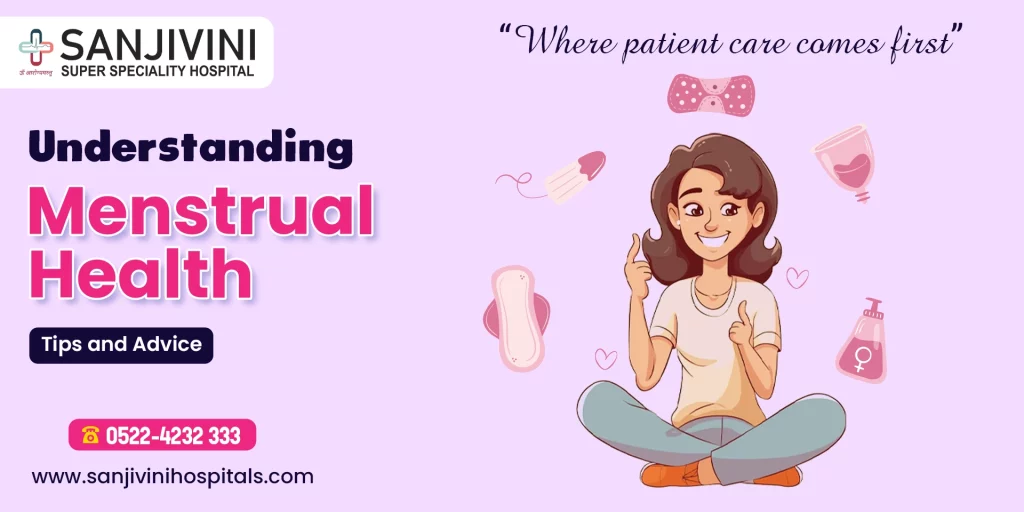Medically Reviewed by: Dr. Sonali Sharma
Menstrual health is a crucial aspect of a woman’s overall well-being, yet it is often a topic surrounded by myths, taboos, and misconceptions. Prioritizing menstrual health is essential for women of all ages to navigate their reproductive journey with confidence and comfort. Our dedicated gynecologist at Sanjivini Super Speciality Hospital Lucknow imparts insightful guidance on diverse facets of menstrual health. Through her expertise, she provides invaluable tips and advice, empowering individuals to proficiently manage their menstrual cycles. This guide aims to shed light on various aspects of menstrual health, offering valuable Menstrual Health Tips and advice to empower individuals to manage their menstrual cycles effectively.
Importance of Menstrual Health
Menstrual health is essential to the well-being and empowerment of women and adolescent girls. It is a state of complete physical, mental, and social well-being and not merely the absence of disease or infirmity, about the menstrual cycle. Achieving menstrual health implies that women, girls, and all other people who experience a menstrual cycle, throughout their life course, can access accurate, timely, age-appropriate information about the menstrual cycle, menstruation, and changes experienced throughout the life course, as well as related self-care and hygiene practices. They should also have access to menstrual products, water, sanitation, and hygiene facilities, and competent and empathic care when needed.
Menstrual Cycle Basics
The menstrual cycle, governed by female hormones, involves four main phases:
- Menstruation: Uterine lining sheds, resulting in a woman’s period lasting 2-7 days.
- Follicular Phase (Days 1-14): Ovarian follicles grow and mature, preparing for ovulation.
- Ovulation (Day 14): A mature follicle releases an egg; some women may experience minor discomfort.
- Luteal Phase: Corpus luteum forms after ovulation, producing progesterone to thicken the uterine lining. If no fertilization occurs, the corpus luteum breaks down, leading to menstrual flow.
The average menstrual cycle is 28 days, but variations exist, especially in the first few years after a woman’s first period, with cycles ranging from 21 to 35 days.
Signs of a Healthy Menstrual Cycle
- Regular Menstrual Cycle: A healthy menstrual cycle typically lasts between 21 to 35 days and remains consistently the same length each month.
- Normal Blood Flow and Color: A healthy period involves 2-4 days of steady flow, followed by a few days of lighter bleeding. The blood should appear as a healthy red color, and there should be no bleeding at any other time in the cycle.
- Absence of Pain or Discomfort: A healthy menstrual cycle should be relatively pain-free, with only mild discomfort and slight distention in the lower abdomen.
- Emotional and Physical Well-being: Women should not experience major mood swings or excessive fatigue during their menstrual cycle.
It’s important to acknowledge that every woman is unique, leading to variations in menstrual cycle length and flow. However, if irregularities, severe pain, or concerning symptoms arise, it’s advisable to consult a healthcare professional for further evaluation.

Common Menstrual Health Issues
Common issues related to menstrual health are:
A. Menstrual Disorders:
- Amenorrhea: Absence of menstruation, caused by factors like pregnancy, stress, hormonal imbalances, or certain medications.
- Dysmenorrhea: Involves painful cramps during menstruation, often linked to conditions such as endometriosis or fibroids.
- Menorrhagia: Characterized by heavy menstrual bleeding, with potential causes including hormonal imbalances, uterine fibroids, or other underlying health issues.
B. Hormonal Imbalances:
- Hormonal imbalances can lead to menstrual problems such as irregular periods, missed periods, or excessive bleeding.
C. Impact of Stress on Menstrual Health:
- Stress can disrupt the menstrual cycle, causing irregularities and even amenorrhea (absence of menstruation).
These issues significantly affect physical and emotional well-being. If you experience persistent or concerning menstrual symptoms, it’s crucial to consult a healthcare provider for guidance.
Tips for Maintaining Menstrual Health
Here are practical tips for promoting menstrual health:
A. Balanced Diet and Nutrition:
- Essential Nutrients: Opt for a balanced diet rich in iron, calcium, and other vital nutrients to support overall menstrual health.
- Nutrient-rich foods: Include leafy greens, whole grains, and lean proteins in your diet to contribute to menstrual well-being.
B. Regular Exercise and Its Impact:
Engage in regular exercise to regulate the menstrual cycle and alleviate menstrual pain effectively.
C. Proper Hygiene Practices:
- Choosing the Right Menstrual Products: Selecting appropriate menstrual products and changing them regularly is crucial for preventing infections and ensuring comfort.
- Personal Hygiene Tips: Maintain proper hygiene by washing the genital area with gentle, unscented soap and warm water to prevent infections and enhance comfort during menstruation.
D. Stress Management Techniques:
Practice stress management techniques, such as meditation, yoga, or deep breathing exercises, as stress can impact menstrual health.
By adhering to these guidelines, women can uphold optimal menstrual health and reduce the likelihood of menstrual issues. If persistent or concerning symptoms arise, seek your consultation at Sanjivini Super Specialty Hospital, Lucknow.

